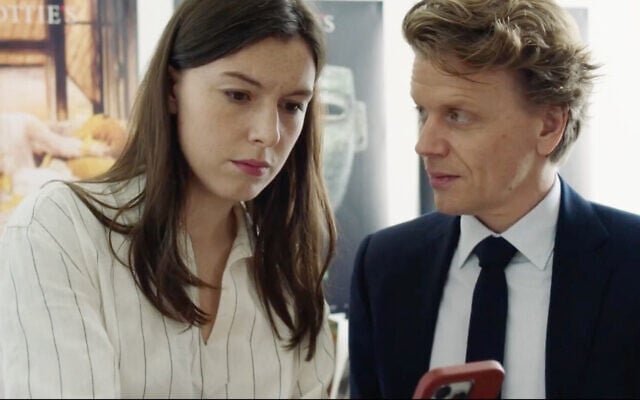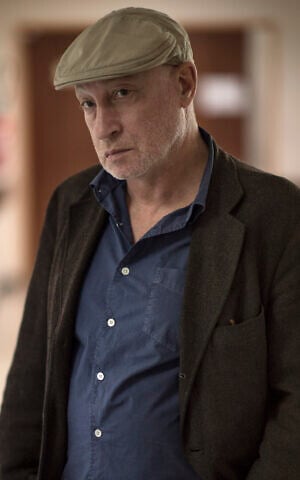Interview'Painting's discovery was the beginning of another story'
In US theaters Oct. 29, Jewish director Pascal Bonitzer’s latest feature centers on a $21 million painting by Egon Schiele that went missing in WWII and turned up on a small town wall
By Rich Tenorio
You will receive email alerts from this author.
Manage alert preferences on your profile page
You will no longer receive email alerts from this author.
Manage alert preferences on your profile page
Reporter at The Times of Israel
Martin Keller, a 30-year-old Frenchman who works in a chemical plant, has invited his friends Sine and Paco over for a card game at his home in the industrial town of Mulhouse. They drink beer and smoke cigarettes, barely noticing the painting of dead sunflowers on the wall behind them.
That painting, it turns out, is actually a masterpiece by the Jewish Austrian Expressionist artist Egon Schiele, who died in 1918. It had disappeared in 1939. The art dealer who had tried to save Schiele’s collection — a fellow Austrian Jew named Karl Grunwald — ended up fleeing empty-handed to the United States, while some of Grunwald’s family perished at Auschwitz. Now, decades later, the long-lost painting resurfaces in a stranger’s home. It should be an easy task to reunite it with its rightful heirs, n’est-ce pas? Well, not so fast.
Things get complicated in “Auction,” a new French feature film based on the real-life narrative of Schiele’s improbably rediscovered painting. Directed and written by longtime French Jewish filmmaker Pascal Bonitzer, Auction makes its US theatrical premiere at Film Forum in New York City on October 29, ahead of a nationwide release.
“One is constantly finding art stolen by the Nazis to this day,” Bonitzer told The Times of Israel through a translator over Zoom. “The museums that own it have not been particularly cooperative in returning works to legitimate owners and descendants.”
The events dramatized in the film took place almost 20 years ago, in 2006, when an anonymous stranger in France phoned in a report of a surprise finding at home: Schiele’s looted masterpiece. Of its provenance, the caller was unaware. Two experts from Christie’s arrived to confirm its authenticity. The painting was restored to the Grunwald family descendants, who auctioned it off through Christie’s. The auction went for $21.6 million, according to The New York Times.
Get The Times of Israel's Daily Edition by email and never miss our top stories
By signing up, you agree to the terms
In “Auction,” the names get changed and the plot gets more complex as the painting’s discovery sets off a whirlwind of activity within the art world.
The plot centers on Paris-based art specialist Andre Masson, who works for an auction house called Scottie’s and shares a name with an actual 20th-century French painter. The film’s Andre is played by French actor Alex Lutz, who previously appeared in the Hulu series “Becoming Karl Lagerfeld” and won a Cesar Award, France’s highest film honor, for his portrayal of Guy. The character of Andre has a penchant for watches and for snappy lines. “Being hated is good for the neurons,” he advises his intern, Aurore.
 Andre and Aurore, played by Alex Lutz and Louise Chevillotte, in a still from ‘Auction.’ (Courtesy)
Andre and Aurore, played by Alex Lutz and Louise Chevillotte, in a still from ‘Auction.’ (Courtesy)
When Andre receives a call from an unknown number, he initially passes it off to Aurore (Louise Chevillotte). He becomes much more interested when he learns it’s about a potential Schiele.
As Andre heads east to Mulhouse to verify the painting’s authenticity, he enlists his ex-wife, art appraiser Bertina (French actress Lea Drucker, who received a Cesar Award for “Custody”). Seeing the masterpiece up close, they are convinced. Schiele, they say, intended the work as an homage to the sunflowers of van Gogh, but these flowers are dead to reflect the toll of World War I.
Then, Martin (Arcadi Radeff) unexpectedly finds documents that prove that the painting’s previous owner was a Nazi police official who likely looted it.
Andre and Bertina fill in more details: After Germany annexed Austria in the Anschluss of 1938, Jewish affairs were turned over to the notorious Adolf Eichmann, who compelled Jews to pay exorbitant sums to leave. Schiele’s art dealer — who is named Wahlberg in the film — fled to France with the late artist’s collection, but was forced to part with it in order to escape to the US.
Showing integrity, Martin says he wants no part of the painting.
 Martin, played by Arcadi Radeff, in a still from ‘Auction.’ (Courtesy)
Martin, played by Arcadi Radeff, in a still from ‘Auction.’ (Courtesy)
“The young man, Martin Keller, in my eyes is perhaps both the most mysterious and intriguing character in the film,” Bonitzer said. “His motivation is entirely altruistic… He says, ‘I don’t want any blood on my hands, I don’t want this painting.’”
But the next steps aren’t so clear-cut, especially after Samson Korner, an art expert brought in to examine the painting, disparages its condition — which Bonitzer said parallels a real-life expert’s reaction.
“[It] was part of the true story as it was told to me,” the director said. “There was a presentation of the painting. Really important people came to look at it, [including] a specific expert in art whose assessment was very much anticipated. He indeed was outraged and scandalized.”
 ‘Auction’ director Pascal Bonitzer. (Copyright Pyramide International)
‘Auction’ director Pascal Bonitzer. (Copyright Pyramide International)
“There were twists that did not stop after the discovery of the painting,” Bonitzer reflected. “The discovery of the painting was the beginning of another story.”
The rightful heirs give Andre an offer for the painting. Although Martin will get 10 percent, Andre deems the offer insultingly low. The heirs will not budge. How to break the impasse?
Without spoiling the plot too much, suffice it to say that viewers should keep an eye on the art intern Aurore, a character that Bonitzer invented for the film. Aurore has a knack for lying, a combative personality and a troubled past — all of which get her into trouble with her boss. In a dramatic scene, she storms out of her job just as Korner is coming in to make his pessimistic appraisal of the painting. Expect a redemption, for Aurore and for the looted masterpiece.
If you’d like to comment, join
The Times of Israel Community.
.png)



